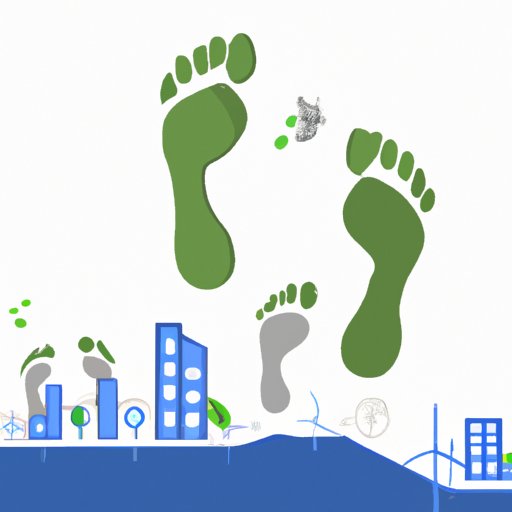Introduction
Ecological footprint is a measure of the amount of land and water required to produce the resources consumed by an individual or group and absorb their waste. It is an indicator of how much pressure humans are placing on the environment and it is used to assess the sustainability of our current lifestyles. The concept was first developed in the early 1990s by scientists William Rees and Mathis Wackernagel, who sought to understand the impact of human activity on the environment.

Exploring the Impact of Human Activity on the Environment
Human activity has had a profound effect on the environment. Natural resources such as forests, soil, and water have been depleted as a result of industrialization, agriculture, and urban development. Changes to climate and weather patterns, including increased frequency and intensity of extreme weather events, have been linked to human activities such as burning fossil fuels and deforestation. Additionally, biodiversity has declined due to habitat destruction and pollution.

Reducing Your Personal Ecological Footprint
Individuals can reduce their personal ecological footprint by making sustainable consumption choices. This includes buying locally produced goods, reducing meat consumption, and choosing products with minimal packaging. Other ways to reduce your ecological footprint include conserving energy and water in the home, reducing waste, and purchasing fewer items overall.
How Governments Measure and Address Ecological Footprints
Governments play an important role in managing and measuring ecological footprints. Local and national policies can be used to encourage sustainable practices, while international treaties and agreements can be used to coordinate efforts between countries. For example, the Paris Agreement, which was adopted in 2016, sets out a global framework for mitigating climate change by reducing emissions.
The Benefits of Sustainable Development for Businesses
Sustainable development has many benefits for businesses. Companies that adopt sustainable practices tend to be more profitable, as they benefit from lower operating costs and increased efficiency. Additionally, customers are increasingly demanding products and services that are environmentally friendly, which can improve a company’s brand reputation. According to a study by McKinsey & Company, companies that focus on sustainability “have seen their stock prices outperform those of their peers by as much as 16 percent over a five-year period.”

Examining Ecological Footprints Around the World
Global trends in ecological footprints show that the world is consuming more than the planet can sustainably produce. According to the Global Footprint Network, humanity is using 1.7 times more resources than the Earth can regenerate each year. Additionally, there are significant regional differences in ecological footprints. For example, according to the World Wildlife Fund, North America has the highest per capita ecological footprint, while Africa has the lowest.
The Role of Technology in Reducing Ecological Footprints
Technology has a key role to play in reducing ecological footprints. Renewable energy sources such as wind and solar power can help to reduce our dependence on fossil fuels. Furthermore, smart technologies such as energy efficient appliances, IoT sensors, and water management systems can help to reduce resource use. Finally, advances in recycling and waste management can help to reduce the amount of waste produced.
Conclusion
In conclusion, understanding ecological footprints is essential for developing sustainable lifestyles and protecting the environment. Governments, businesses, and individuals all have a role to play in reducing their ecological footprints. By adopting sustainable practices, implementing smart technologies, and investing in renewable energy sources, we can work towards a healthier, more sustainable future.
(Note: Is this article not meeting your expectations? Do you have knowledge or insights to share? Unlock new opportunities and expand your reach by joining our authors team. Click Registration to join us and share your expertise with our readers.)
